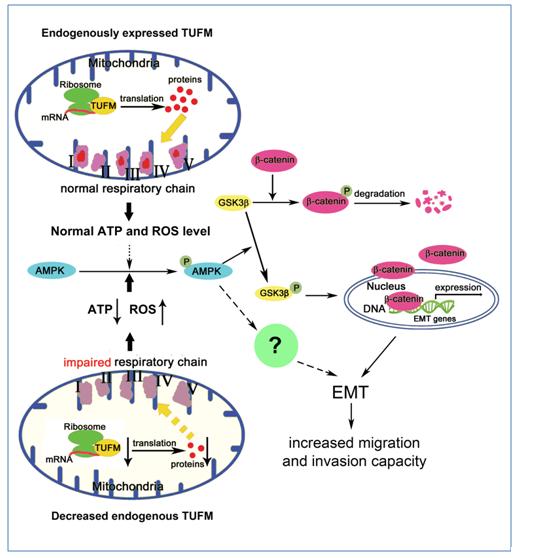
Although mitochondrial dysfunction in human cancers has been documented in many reports, the mechanism by which mitochondrial dysfunction contributes to tumor progression remains unclear. Epithelial-to-mesenchymal transition (EMT) is an important process that contributes to cancer progression. Cancer cells can detach from the primary tumor and intravasate into lymph or blood vessels through EMT. Up until recently, whether regulation of EMT is a linkage between mitochondrial dysfunction and cancer progression remains to be characterized.
TUFM is a nuclear gene-encoded protein that is critical for mitochondrial respiratory function. It is a key factor for the translation of mitochondrial genes, which controls the amino acid elongation of mtDNA-encoded peptides. Prof. SONG Jianguo and his colleagues at the Institute of Biochemistry and Cell Biology, Shanghai Institutes for Biological Sciences, Chinese Academy of Sciences, found that TUFM expression level was positively correlated with that of E-cadherin and decreased significantly during the progression of human lung cancer.
TUFM knockdown induced EMT, reduced mitochondrial respiratory chain activity, and increased glycolytic function and the production of reactive oxygen species (ROS) in lung cancer cells. Mechanistically, TUFM knockdown activated AMPK and phosphorylated GSK3β and increased the nuclear accumulation of β-catenin, leading to the induction of EMT and increased migration and metastasis of lung cancer cells.
Their studies provide a molecular link between mitochondrial dysfunction and EMT, which is implicated in lung cancer progression.
This work entitled “TUFM downregulation induces epithelial-mesenchymal transition and invasion in lung cancer cells via a mechanism involving AMPK-GSK3β signaling” was published in Cellular and Molecular Life Sciences on January 18, 2016. The work was supported by the Ministry of Science and Technology of China and the National Natural Science Foundation of China.

Schematic illustration: The role and underlying mechanism of TUFM in EMT and cancer progression. (Image by Prof. SONG Jianguo)

86-10-68597521 (day)
86-10-68597289 (night)

52 Sanlihe Rd., Xicheng District,
Beijing, China (100864)

